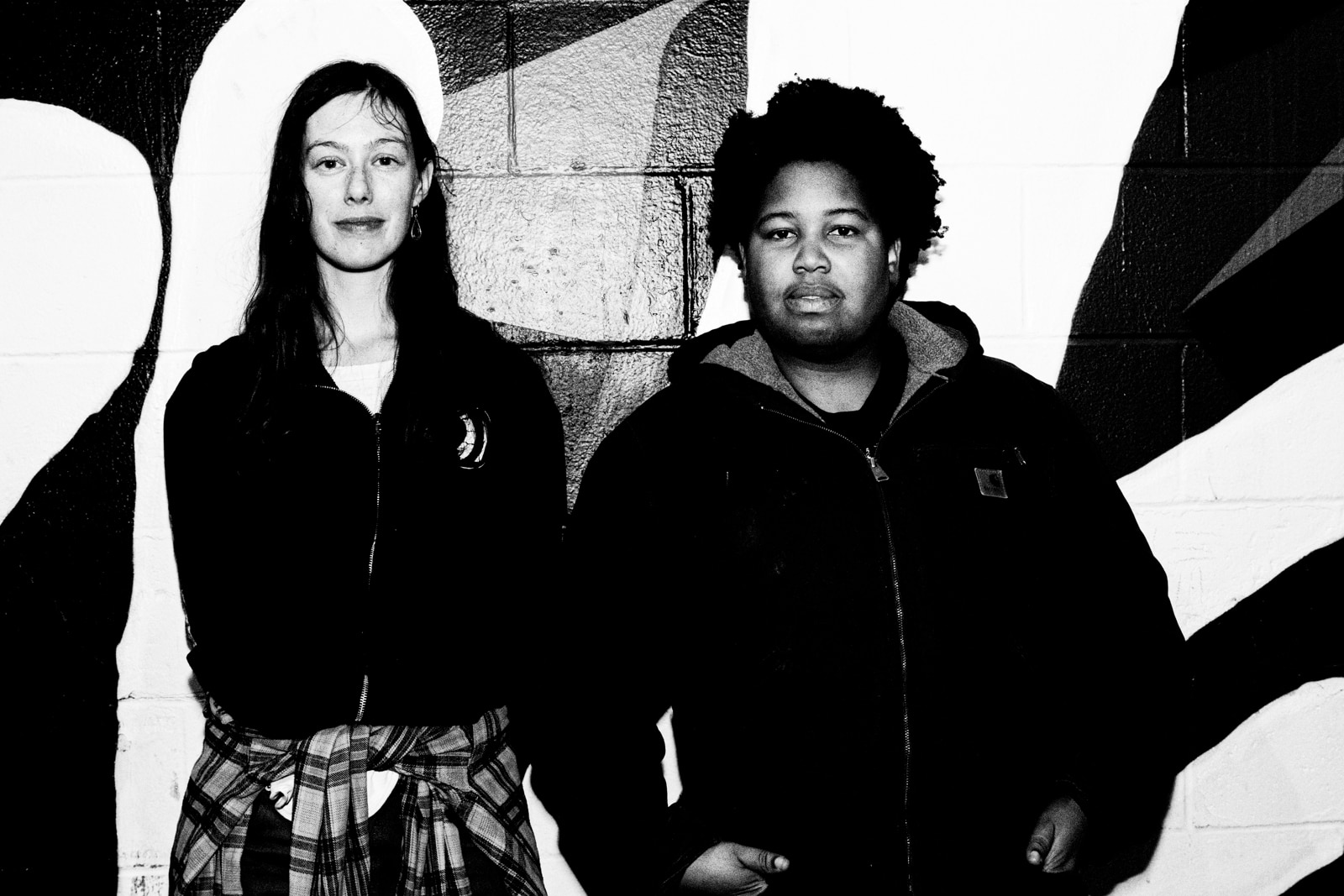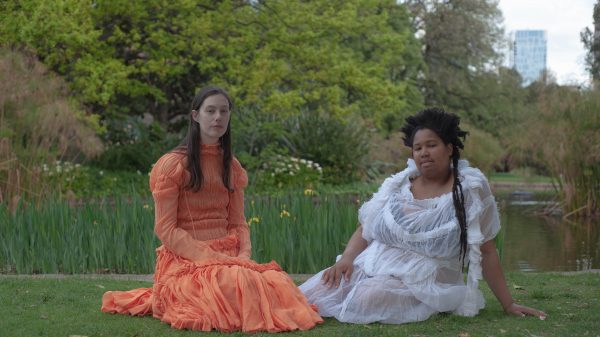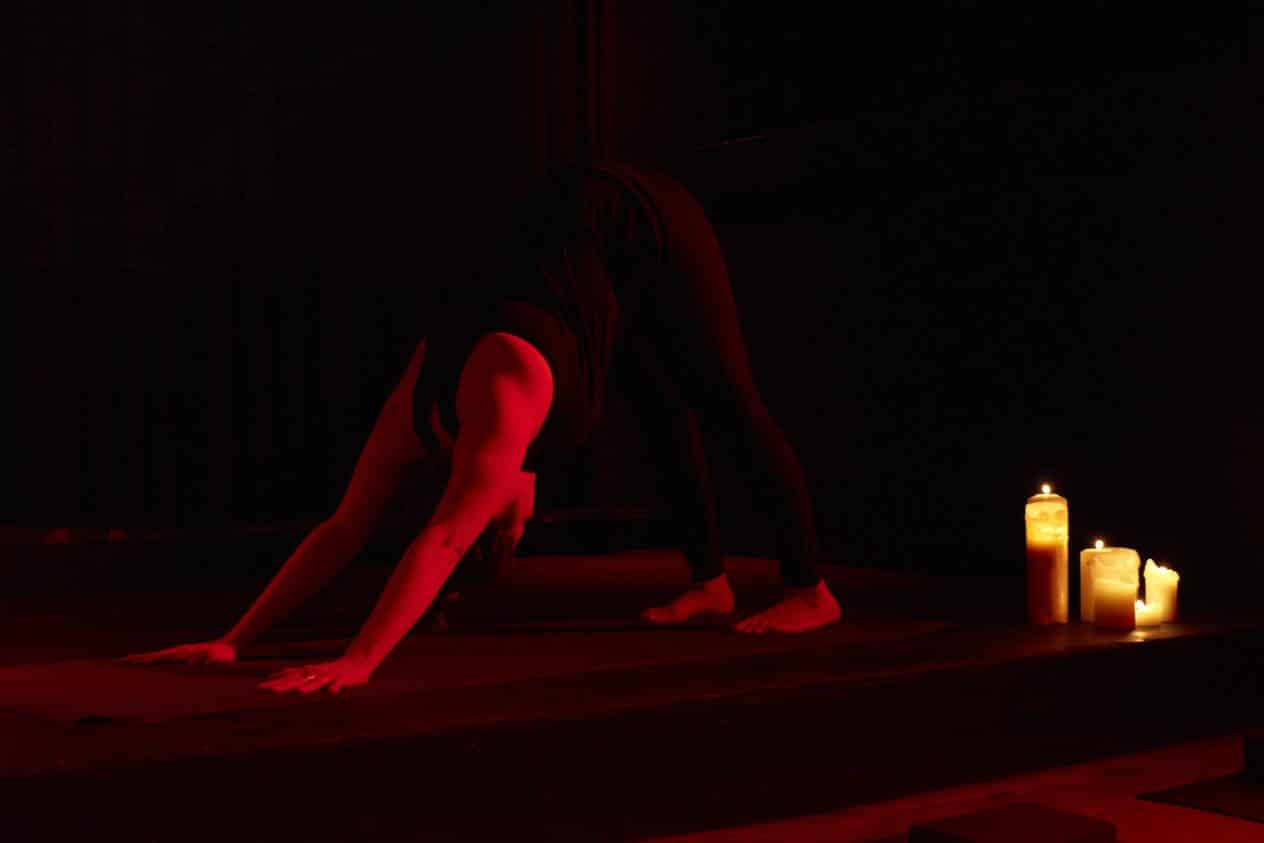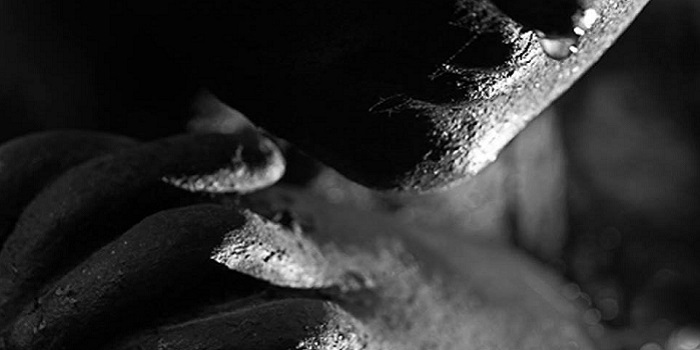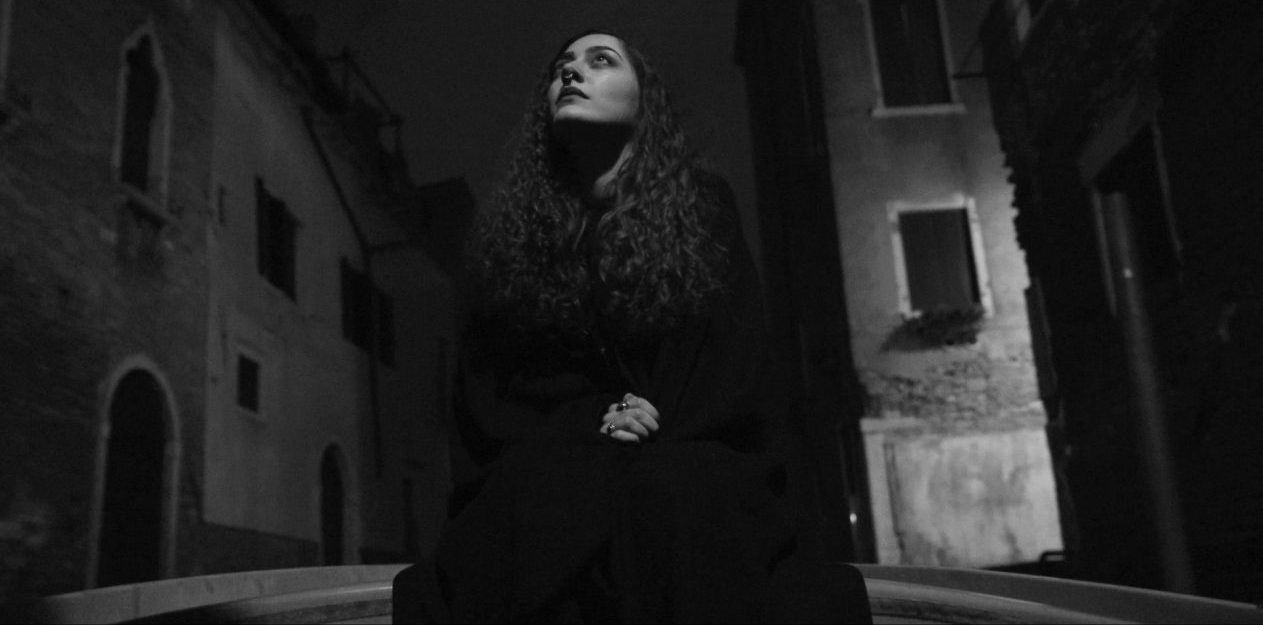Formed in 2017 by Takiaya Reed and Sylvie Nehill, Australian Doom Metal project Divide and Dissolve stands out from their contemporaries in some unexpected ways. Thematically, the duo’s work tackles a number of socio-political issues that are seldom addressed by heavy music; colonialism and its effects on indigenous populations, white supremacist ideologies, patriarchal structures, and even the gas-lighting of victims.
Sonically, Divide and Dissolve’s sound has a conventional foundation with drums and distorted guitars, but uses saxophones to pierce the voluminous swathes of low-end tones. The band’s recorded works gives its listener frequent palate cleansers of spoken word and ambient tracks between its heavier ones. While most of the band’s work is instrumental and doesn’t present an overt message upon listening to it, the band’s ideologies are clearly presented in their track titles and social media content. This is a smart strategy to educate fans; people who gravitate to the band’s sound will find themselves informed of its themes when they dig deeper, and they’ll be more receptive to their ideas after some emotional investment.
Divide and Dissolve’s 2019 tour with Sumac is when I became aware of them; music videos shared to the San Francisco show’s event page showed the duo dishing out some really heavy, yet meditative and spacious sounds. While I didn’t make it to that show, the project occupied a small spot in the back of my mind. When they toured with Unknown Mortal Orchestra in December, I knew I had to see them perform, and I needed to find out more about their production processes and driving philosophies.
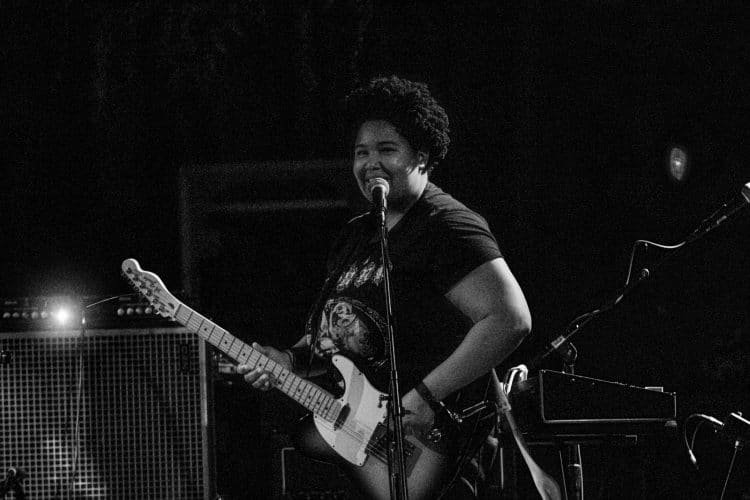
Interview conducted on December 3rd, 2019 at The Catalyst in Santa Cruz, California.
Participants:
C – CvltNation
T – Takiaya Reed
S – Sylvie Nehill
C: I had a hard time finding relevant information online; what was the catalyst that jump-started your project?
S: Oh, well, we [Takiaya and Sylvie] met at a show in Melbourne, and had both heard of each other through our mutual friends. We met, and Takiaya said, “I play saxophone, I heard you play drums. Do you want to play music?” and I was like, “Oh my god, I’ve always wanted to play with a saxophone player!” And then we just started the next week.
T: Yeah, we just… connected.
S: Yeah. So, we played music for a while, Takiaya and I were hanging out, and Takiaya was like, “Our band is going to be political.” [Sylvie turns to Takiaya] Do you want to tell that story?
T: Yeah; I had a dream. I was sleeping, and then I was ripped out of my dream, and I was like [Takiaya gasps] “Oh my gosh! We have stuff to do!” We’re both indigenous and we’re like, “we need to fight for our ancestors and our people.” So we were like, “Okay! YOLO!”
S: We’d just been getting to know each other at that point, and you’d [to Takiaya] shown me a photo of your grandma. We were just talking about ourselves, and I feel like it came out of that as well; connecting to the people who, like our elders, came before us, and people we’ve never been able to meet. Our ancestors. I feel like maybe it had something to do with us talking a lot about where we came from.
T: It just felt like this necessity and emergency for both of us.
C: There was something happening, and you wanted to take action and make a difference in your way?
S: Yeah, this is why we’re both just completely compelled to make music — each of us is. If we’re not playing music, as individuals, we’re unhappy. We have to play music. And so, with this thing we absolutely have to do, why not actually say something with it, and speak up?
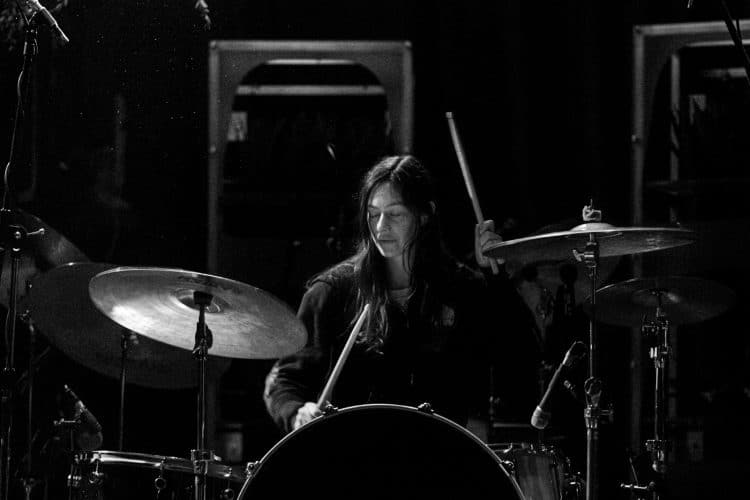
C: So, in terms of the sound, did that just grow organically into a sort of Doom / Neoclassical style, or was this an idea you already had?
T: It’s the only sound that we like to make! [laughs]
S: Yeah, totally.
C: So, previous to this project, what kind of music did you each like to create? Was this [Divide and Dissolve] similar in sound?
S: Well, as a drummer, I basically played in a disco band. I used to play really fast drums — my friend called me “the machine” — and I’ve played in all kinds of bands. But when we [Sylvie and Takiaya] began playing together, it was all just coming together. It definitely felt organic to be delving into heavier and heavier nuances and ways of playing.
C: And you’re [to Takiaya] obviously a multi-instrumentalist; what was your background in the kinds of projects you worked on?
T: I’m a classically-trained saxophonist, and I had a few friends who said, “You should play guitar.” And I was like, “Okay!” I like picking up all types of instruments, but I didn’t really start playing guitar until we started playing music. I’m really new to the instrument. It feels fun. It’s like a polyphonic expression. It’s an extension of my thoughts, basically.
C: I was watching some live videos of you two playing. You look very meditative. What are you thinking about? Are you thinking about the concepts behind the tracks, or focused on precise instrumentation, or…?
T: Well, we’re always focused on decolonizing. And we’re very intentional with every note we play. And we think about the water, we think about the mountains, the rivers, and the life that’s possible. The possibilities. And we think about our message, and the destruction of white supremacy, and our ancestors. And we think about positivity, and joy. I don’t know — we’ve talked about what we think about, and those are the things we’re always focusing on and what we fall into with each other, organically.
S: Absolutely, yeah. We’re not thinking about one thing the whole time we’re playing; we’re thinking about all of those things, and coming from our breath, and feeling the Earth, and channeling the motion of the water, for sure. And we’re creating air channels. Like, you stand in the room and you can feel air blowing past you. We’re connecting with the Earth.
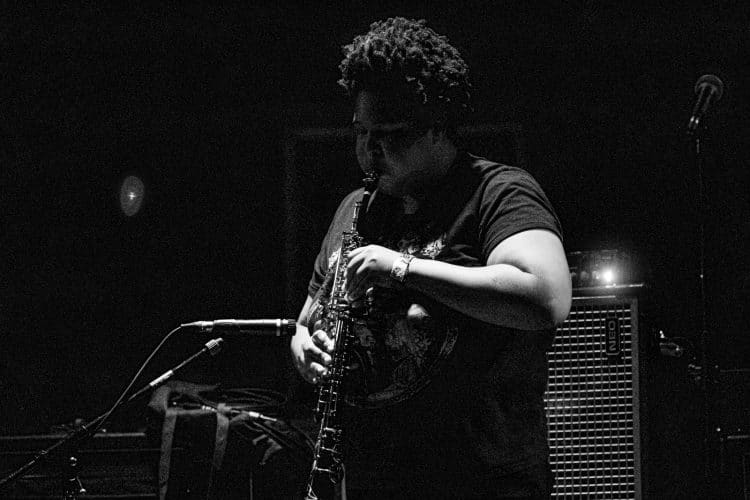
C: Your music videos have a very literal “bonding with nature” kind of imagery. Laying on soil, going into streams or lakes. Tell me about your connections to nature. Do you actually spend a lot of time in nature, or are these [videos] meant to be more metaphorical?
T: We’re of the Earth. We’re deeply grounded in the Earth and love the Earth and nature. We both spend a lot of time outside, connecting and just having a deep appreciation for its beauty and why we have to help protect it. People are trying to destroy it.
S: I think if people sense intensity in our performance and our music, it’s anger. We’re angry with what’s happening to the Earth and people of the Earth.
C: What would you say are a couple of your biggest concerns right now, just in the state of the world? I know there’s a lot to pick from.
S: I would say the problems happening now are connected to problems since imperialism and colonization began. Black and indigenous people dying, and having their water taken from them and poisoned. People being moved off of their land. It’s extremely violent. The connections are being broken.
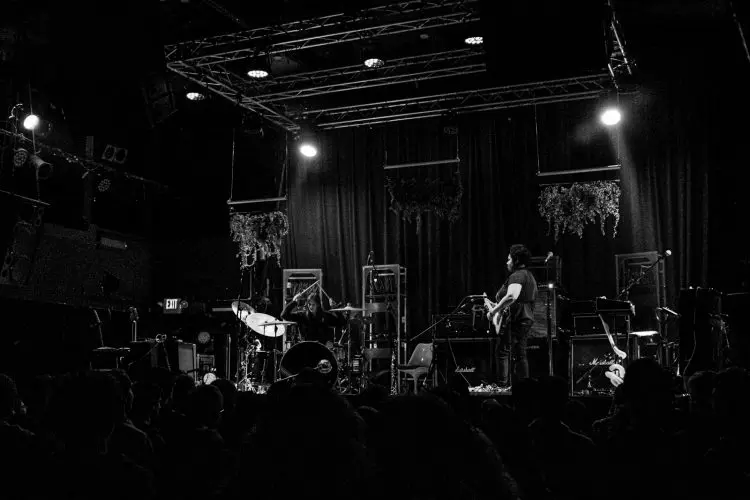
C: I have a lot of friends who’ve escaped the U.S.A. to other places, just because of the state of things here.
S: Things aren’t better in Australia.
C: I don’t really know what’s going on over there, to be honest. It almost feels like Australia’s native populace is represented in popular media more than, say, Native Americans are here.
S: In jail? In the incarceration system? It’s really intense in Australia.
T: There’s this thing that people talk about; “deaths in custody.” And that’s talking about how aboriginal people are being murdered while being imprisoned. Or police brutality; the police will just kill aboriginal people and the people will have a blatant disregard for black death. There’s this horrible program called “The Intervention,” and it’s just murdering people, and the legalization of indigenous death.
C: How do they rationalize that? How are they getting away with something like that?
T: Because of white supremacy and because of colonization, people rationalize the dehumanization of people they perceive as a threat to their power. I think it’s just a deep power imbalance.
S: And that power imbalance has been going on for generations, too, so it’s been inherited. This white supremacy. It’s been perpetuated and it’s upheld by the law. The law of the white people who’ve invaded that country.
C: So, I have to bring up that the United States celebrated Thanksgiving a week ago. I was just wondering — does that kind of rub you the wrong way, seeing celebrations of it while you were touring the USA?
T: Yes, “Thanks-taking” is a celebration of genocide. And it’s awful to celebrate people dying, and being given diseases, and just disregard for all the suffering. It’s atrocious. “Indigenous people day” should be every day. And all the people that built Turtle Island. Like black people who were enslaved, and indigenous people who were enslaved, and LatinX people who were being caged away at the border. We want that horrible day of grieving to just be eliminated.
C: I should try to get this out of such dark territory.
S: [laughs] Heavy, heavy territory.
T: [laughs] Yeah, we’re a heavy, heavy band. Gettin’ heavy.
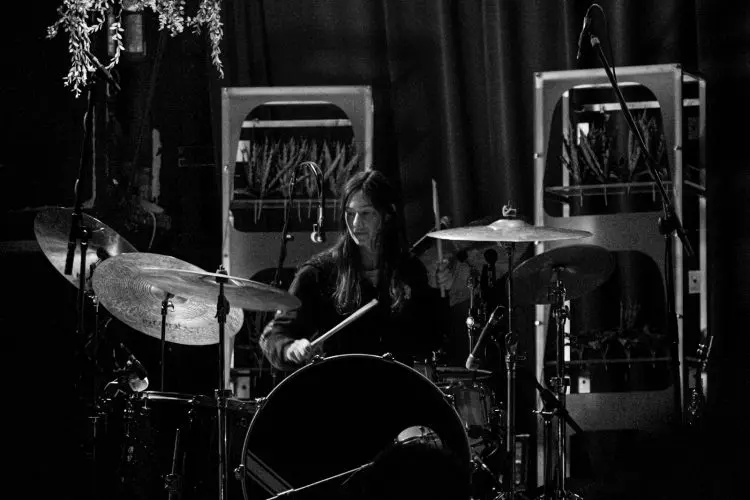
C: What do you want the audience to feel when they witness a [Divide and Dissolve] performance?
S: I don’t intend for people to feel a particular way. I intend for people to react with the experience, with all of their experiences. Like Takiaya was saying, everyone is different, and everyone is going to have a different experience with our music and what we’re talking about. Some people will hopefully feel empowered. And some people might feel really shaken.
T: I would like for people to feel like their realm of possibilities expanded once they’ve seen us play. That it’s possible for indigenous to get their land back, and for the legalization of black and indigenous death to end. And for people to be kinder, and more loving to each other. That would be awesome, if they felt that way.
C: I was wondering if there were people that were unaware and you found out you managed to expand their consciousness…
T: People have huge reactions to our work. And sometimes people just didn’t have the opportunity to know. To learn what’s been going on. It’s kind of challenging too. Sometimes you don’t have the opportunity to be exposed to this stuff. We’re not here judging people, we’re just like “Hey, this is what’s happening.” and people are like, “Woah, okay, cool.” and we’re just really open to these types of experiences, and we’re so pumped to talk to people and have conversations about it.
C: Biggest learning experiences on this most recent tour? Whether it’s dialing in your sound live, or being more efficient in touring, or….
T: It’s important for us to trust each other. And I feel like we learn this lesson every time we’re on tour.
C: So, the music video for “Prove It” — I like the lo-fi, kind of grainy digital aesthetic that it has going on. I was trying to figure out if there was a concept you were trying to get across, because several times in the video there are dolls, several different stores, and then you’re wearing hats, one says “KISS” another says “BABY”, or something like that. I was wondering: are there some in-jokes here, or what am I missing?
T: You know what, I think the music video just reflects how goofy we are.
S: It was just us hanging out. It’s the intention. Yeah, this is our music, and this is what we do.
T: If you were walking down the street with us, we would probably be wearing the same hats
S: Just chilling, laughing. It was so cold when we filmed that.
T: James did an amazing job.
S: James Robinson, who is this incredible photographer and filmmaker. He was kind enough to just walk with us and hang out.
C: Yeah, it was a lot different from your previous music videos. Which brings me to another random one: I was digging around, and I guess one of your first music videos was more politically charged; you spray a statue of a colonizer with urine. I was looking at the comments on the YouTube video. You got a lot of trolls, you got a lot of people trying to rile you up. Do you think that you made your point and it was effective, and maybe that’s how you can kind of tell? Or do you think that’s just people being people?
T: We can’t gauge our success by the amount of trolls.
S: [laughs] That’s so true.
C: Well, you know, sometimes people want art to provoke.
S: Yeah. I think those people find things to be provoked by. I hope it made people think about the kind of respect that’s afforded to those people in the predominantly white culture in those countries.
T: Why would we worship a murderer and rapist? We don’t do that.
C: I think a lot of people are complacent, and ignorant, and are unable to think about things like that objectively because of how they’re raised.
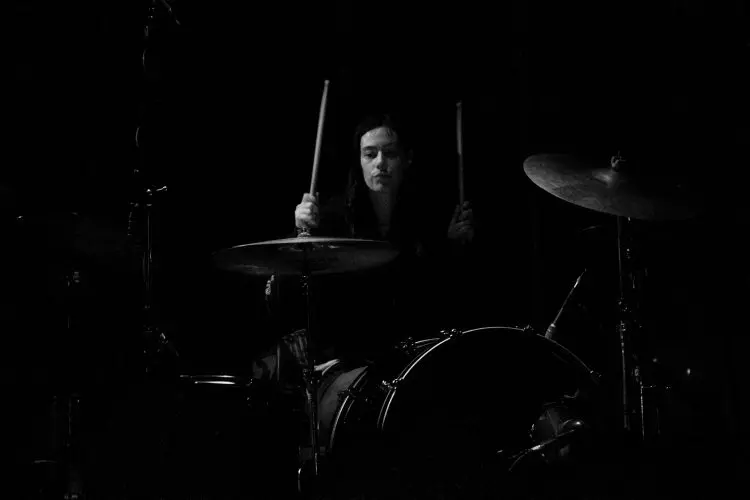
C: So, tour’s coming to a close. But you’re working on a new album — ‘Gaslight’, is it? So, tell people how the sound of it may compare to previous works and what you’re excited about and just everything that you love about this new album you’re working on.
T: I think it’s really uplifting. And it’s produced by Ruben who’s in Unknown Mortal Orchestra. And we’re just really excited to share this work with everyone.
S: Yeah, I don’t want to say too much about it. There was a lot of love put into it.
C: How long did you guys spend working on it?
S: We wrote it over a month. And then we recorded it in a week.
C: I remember seeing a comment that you guys just play off each other really easily when you’re building tracks. That was the case for this album too?
S: Definitely
T: Absolutely
C: Is there a running theme throughout it that connects all of the tracks together?
T: Well, the song ‘Prove it’ is about people saying, “Oh, I had this experience.” and someone else is saying, “I need tangible evidence!” “Well, I can’t really provide that for you!” It’s about trying to express yourself when people doubt your own experience.
C: And in terms of sound, I know you said you don’t want to give away too much. Throw out a few descriptors how this album kind of sounds. Is it going to be intense? Is it going to be big?
S: Yeah.
T: It’s beautiful, too. It’s very pretty.
C: Is it going to ebb and flow, is it going to be some more subdued portions?
T: You’ll have to listen to it to find out! [laughs]
Divide and Dissolve’s most recent album, Abomination, has been released on the Dero Arcade label. You can check out the band’s official website here.

